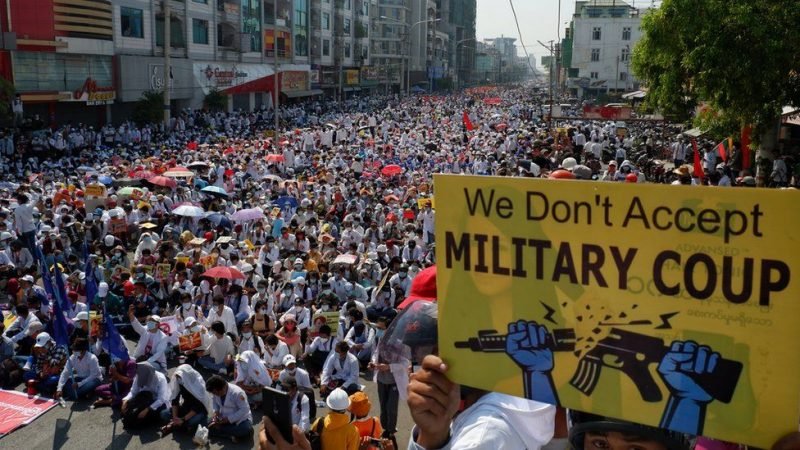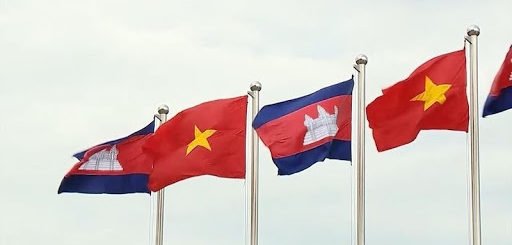Myanmar Coup: What’s in Store for Beijing?

The recent coup has led to multiple uncertainties regarding projects, economy, and ideological dilemmas leading to possible changes in the foreign policy of Yangon towards Beijing.
On February 1st, the military coup which was led by the Burmese Army, proclaimed numerous miscalculations in the election result which took place where the NLD had won a majority in November, due to which they detained many senior NLD leaders for a year. Hence, it has created question marks among many countries, some fearing a move initiated by Beijing based on selfish geopolitical calculations. Many democratic countries were on the verge of putting sanctions on Myanmar for these developments initiated by the military but surprisingly China vetoed this move by playing its permanent UNSC membership card at a time many of its media outlets are denying any support to the coup or regime setting.
In a recent interview with Global Times, Amb Chen Hai felt that the Chinese side wasn’t informed about any development or regime change, where again Beijing is in a state of denial with respect to a meeting was held between Wang Yi and the military chief in January, where General Min Aung Hlaing appreciated Chinese role in initiating infrastructure in the region and also assured support to Beijing’s authoritarian activities in Taiwan, Hong Kong and Xinjiang. Looking at this development, when the actual transition occurred, the Chinese tone was neutral where they felt that communication and dialogue between the civilians and the army is a good way to settle the matter between themselves. In the past, there have been instances where the Chinese filled in gaps when Myanmar was in isolation in the midst of the 1997 imposed by Western countries.

Background of Yangon’s Military Links with Beijing
Since 1962, military rule started to become prevalent in Myanmar and there was no place for democratic processes. Previous military commanders had a good rapport with CPC officials where the latter even gave financial and defence aid to the armed Communist group in Myanmar even at a time when Yangon was isolated by the West due to economic sanctions imposed.

Toru Takahashi, an Editor at the Nikkei Asian Review, opined about the militants for which it is viewing various type of deadlocks in its way. The military era also witnessed the blockage of Mytisone Dam, in 2011 which the Chinese were funding. If a delay or tilt occurs with regards to projects and investments during this military rule then there could be a possibility for Yangon to reach out towards the West, which the Chinese don’t approve of.
When the Rohingya crisis occurred, which also is a doing of the Tatmadaw where again, Beijing mediated when the West was again planning to go against Aung San Suu Kyi for handling the situation. According to Dr Bertil Litner, the current Tatmadaw government’s stance vis-a-vis Beijing is a question about which side Yangon will go to because of his previous associations and praises for the Chinese Communist Party, whom he credited for acting as a good mediator in the Rohingya conflict where factors post-coup could make it imperative for Beijing to intervene with regards to the opposition of the coup by the Rohingya group in case if there is increased resentment.
Relations After Coup: What to expect?
The NLD government’s date with Beijing led to many hopes and aspirations regarding Yangon’s economic development which is now a question mark. Aung San Su Kyi visited China 2017 onwards, making this period really important when it comes to Chinese investments in Myanmar under the China Myanmar Economic Corridor (CMEC), which focusses on initiating Chinese funded- pipeline, port development, road connectivity and railways where projects such as the Kyapkyou port and the Muse railway line have been initiated. There is a requirement for General Min Aung Hlaing to choose between right and wrong, whether to support a democratic rule or completely move towards Beijing. In order to be safe from debt traps he needs to even keep his foreign policy balanced since, during the NLD tenure, USD $ 21.5 billion has been invested by Beijing in multiple hydropower and mining projects.
This coup has marked an uncertain road for Myanmar where the Chinese are viewing such developments with regards to electoral systems as tools of Western governance and aspirations. These media statements are some evidence of the Chinese putting the blame on the West for geopolitical rivalry where Washington is continuously being blamed for spreading lies about arms being provided to the troops by Beijing during the coup.
Democracies such as the US, Japan and India have strongly condemned these developments in Myanmar supporting the rule of law, order and immediately restore democratisation along with the release of detained leaders. The geopolitical angle here is to stop a rising China, bringing Myanmar closer towards these countries to deter Beijing’s meddling through regime change or perception creation.
Conclusion
Beijing needs to be careful of opportunity costs when it comes to supporting military coups and movements since it is also an authoritarian power that sometimes supports such institutional transitions. The Chinese will leave no stone unturned when it comes to its territorial ambitions with regards to its projects and Yangon, which has committed to the BRI projects, doesn’t want to be under debt or isolation again in case if this coup goes on for a longer period with multiple sanctions from Western countries. Finally, it all depends on Yangon which side to choose.


















